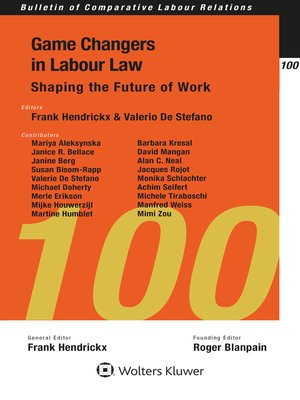Game Changers in Labour Law
ebook ∣ Bulletin of Comparative Labour Relations Series
By Frank Hendrickx

Sign up to save your library
With an OverDrive account, you can save your favorite libraries for at-a-glance information about availability. Find out more about OverDrive accounts.
Find this title in Libby, the library reading app by OverDrive.



Search for a digital library with this title
Title found at these libraries:
| Library Name | Distance |
|---|---|
| Loading... |
The renowned international labour law scholars contributing to this incomparable volume use the term 'game changers' to refer to evolutions, concepts, ideas and challenges that are having, or have had, major impacts on how we must understand and approach labour law in today's global economy. The volume derives from an international conference organized by the Institute for Labour Law at the University of Leuven, Belgium in November 2017. This initiative is pursued in the spirit and with the methods of the late Emeritus Professor Roger Blanpain (1932–2016), a great reformer who continuously searched for key challenges in the world of work and looked as far as possible into the future, engaging in critical reflection and rethinking the design of labour law. While seeking to identify the main game changers, the authors explore new pathways and answers which may help to understand and shape the future of work.
This is the 100th of Kluwer's Bulletin of Comparative Labour Relations, a series Professor Blanpain launched nearly fifty years ago. The contributors address, and reflect on, such vital issues and topics as the following:
There are also chapters devoted to specific issues in France, Italy, the United Kingdom, Estonia, China and the United States.
Roger Blanpain consistently reminded us that labour relations are power relations. Although this book shows that the power balance is tipped towards employers in today's world, what is nevertheless very clear is that labour law can play a crucial role in re-enlivening equitable outcomes, fairness, decent work and social justice in our contemporary and future societies, and that academia can help to understand, guide and shape that future. For this reason, this book will be invaluable to professionals in labour relations, whether in the academic, policy or legal communities.







